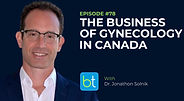BackTable / OBGYN / Podcast / Episode #7
Advanced Ultrasound for Endometriosis
with Dr. Mathew Leonardi
On this episode, Dr. Mathew Leonardi of McMaster University Medical Centre joins Drs. Park and Hoffman at the mic to discuss his experience with advanced ultrasound for endometriosis.
Be part of the conversation. Put your sponsored messaging on this episode. Learn how.

BackTable, LLC (Producer). (2022, December 1). Ep. 7 – Advanced Ultrasound for Endometriosis [Audio podcast]. Retrieved from https://www.backtable.com
Stay Up To Date
Follow:
Subscribe:
Sign Up:
Podcast Contributors
Dr. Mathew Leonardi
Dr. Leonardi is a minimally invasive gynecologic surgeon and sonologist with McMaster University Medical Centre in Hamilton, Canada.
Dr. Amy Park
Dr. Amy Park is the Section Head of Female Pelvic Medicine & Reconstructive Surgery at the Cleveland Clinic, and a co-host of the BackTable OBGYN Podcast.
Dr. Mark Hoffman
Dr. Mark Hoffman is a minimally invasive gynecologic surgeon at the University of Kentucky.
Synopsis
Dr. Leonardi is a minimally invasive gynecologic surgeon and sonologist (ultrasound specialist) in Hamilton, Canada. He received his PhD at the University of Sydney, studying the role of ultrasound for diagnosis of endometriosis and its influence on surgical management of the disease. He then completed a 2-year fellowship in advanced gynecological surgery and ultrasound in Sydney, Australia. He now conducts a comprehensive clinic for the diagnosis and management of endometriosis.
The episode begins with Dr. Leonardi describing his initial fascination with ultrasound as an OB/GYN resident and discussing his various training internationally for advanced gynecological surgery and ultrasound. He highlights specific steps he took, colleagues he collaborated with, as well as barriers he encountered and overcame along the way.
The group then talks about the current role of ultrasound within gynecologic care and its potential in the field. Dr. Leonardi explains how he built a gynecologic ultrasound unit, detailing the workflow of his clinic. During this time, he also compares the use of ultrasound versus alternative imaging (e.g., MRI), ultimately favoring the dynamic, efficacious, and cost-effective benefits of ultrasound.
Lastly, the group discusses the topic of bowel endometriosis. Dr. Leonardi describes the limitations of ultrasound in this setting, such as diagnosis of disease that spreads beyond the pelvic brim. The group then transitions to describe the involvement of colorectal surgeons in these cases and brings to light the need for additional training and exposure for minimally invasive gynecologic surgeons.
Resources
Leonardi M, Espada M, Condous G. Closing the communication loop between gynecological surgeons, diagnostic imaging experts and pathologists in endometriosis: building bridges between specialties. Ultrasound Obstet Gynecol. 2021 Apr;57(4):523-525. doi: 10.1002/uog.23595. PMID: 33491846.
Transcript Preview
[Dr. Mathew Leonardi]
When I was doing residency, I remember vividly some of the other surgical services. They would have the images open in the operating room, they'd be looking at the images right before operating on the patient. I can tell you in my residency of OB-GYN, there was a single surgeon, Lisa Allen, who is a PEG and an MIS surgeon, duo, amazing. She was the only person that I remember doing that with opening the ultrasound images in the operating room right before operating on the patient. It was not part of the culture. I think that's another strategy that's really easy to do now as well. As long as you have access to the pictures, open them before you're going to operate on them. If you're the resident that's going to be involved in the case, look at the pictures, start to correlate to the sonographic views with the surgical views, even if they're not the advanced ultrasounds that are looking for deep endometriosis yet, starting to understand what adenomyosis looks like, what fibroids look like, what different ovarian cysts look like.
It's right there in front of you. You have the ultrasound images, the report, the surgical view, and then finally, the surgical pathology. That learning curve is right there for you, but it's not part of the culture yet. I'd encourage residents who are really intrigued, that's one other strategy that you could use. People will find other strategies for sure, like attending conferences and courses.
Disclaimer: The Materials available on BackTable.com are for informational and educational purposes only and are not a substitute for the professional judgment of a healthcare professional in diagnosing and treating patients. The opinions expressed by participants of the BackTable Podcast belong solely to the participants, and do not necessarily reflect the views of BackTable.











